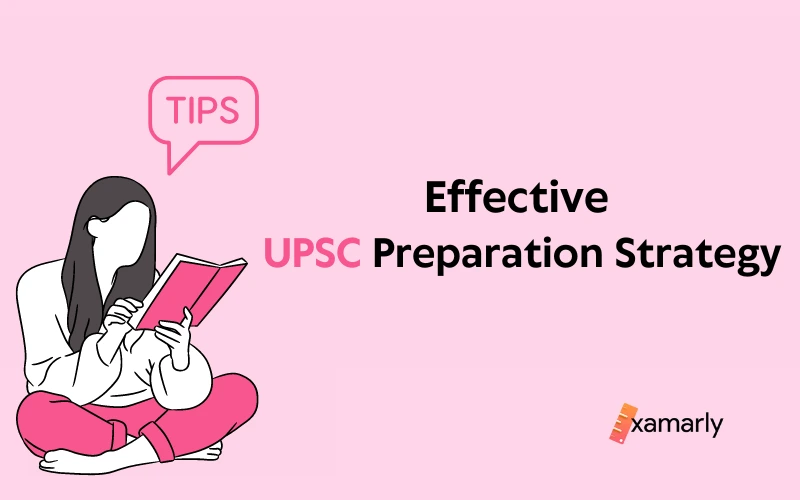Are you looking for the best UPSC preparation strategy to crack the exam stages like a pro? The UPSC examination is a competitive test that requires a solid understanding of the syllabus, examination pattern, and the best study methods.
A comprehensive preparation strategy should include familiarizing yourself with the syllabus, having a consistent study schedule, taking mock tests, and staying updated on current affairs.
Consistent effort, dedication, and the right approach will help you achieve your goal of becoming a civil servant. Stay focused, and stay disciplined, and you’ll be well on your way to success in the UPSC examination. This blog explains to you the right approach and exclusive preparation tips.
- Exam Stages – UPSC Preparation Strategy
- How to Formulate UPSC Preparation Strategy?
- 11 Essential Steps for an Effective UPSC Exam Preparation Plan
- 1. Foundational Understanding of the UPSC Examination
- 2. Break Down Your Syllabus Into Parts
- 3. Make A Study Schedule That Suits You
- 4. Make Your Basic Concepts Crystal Clear
- 5. Study Standard Books For IAS Exam Preparation
- 6. Read Newspapers For Current Affairs
- 7. Revise, Revise And Revise!
- 8. Solve Previous Question Papers
- 9. Evaluate Yourself At Each Step Of Exam Preparation
- 10. Practice Answer Writing
- 11. Be Positive
- 7 Things You Shouldn't Do As a UPSC Aspirant
- Conclusion
- Frequently Asked Question
- What is the best strategy for preparing for the UPSC exam?
- How long does it take to prepare for the UPSC exam?
- What is the most important part of the UPSC preparation strategy?
- How to improve current affairs knowledge for UPSC preparation?
- How to prepare for UPSC without coaching?
- What is the best time to start preparing for the UPSC exam?
- What is the importance of NCERT books for UPSC preparation?
- What should be the daily study schedule for UPSC preparation?
- How to balance UPSC preparation with work or college?
- How to stay motivated during UPSC preparation?
Exam Stages – UPSC Preparation Strategy
Preparation for the UPSC civil services exam can be divided into three parts: Prelims, Mains, and Interviews.
| Stage | Description | Marks |
|---|---|---|
| Prelims | Two-stage objective test to assess general knowledge and aptitude | 400 marks (200 marks per paper) |
| Mains | Written examination to test the in-depth knowledge of subjects and writing skills | 1750 marks |
| Interview | Personal interview to assess the candidate’s personality and communication skills | 275 marks |
| Total | Total marks for the UPSC exam | 2425 marks |
Note: The marks mentioned above are tentative and may vary according to the latest UPSC notification.
Prelims Exam:
- Read the NCERT books for a solid foundation in all subjects.
- Stay updated with current affairs and read newspapers regularly.
- Solve previous years’ question papers and take mock tests.
- Focus on improving your speed and accuracy.
Mains Exam:
- Read the syllabus thoroughly and understand the exam pattern.
- Read NCERT books and make notes for quick revision.
- Write as many essays and answer writing practice as possible.
- Prepare well for the optional subject.
Interview:
- Prepare for the Personal Interview by reading about current events and issues of national and international importance.
- Brush up on your knowledge of your academic and professional background.
- Be aware of your strengths and weaknesses and prepare to talk about them.
- Be confident and maintain good body language.
Overall, consistency and dedication are the keys to success in the UPSC exam. Stick to a study plan, stay motivated and avoid stress.
How to Formulate UPSC Preparation Strategy?
To achieve your targets, you need to make a UPSC preparation strategy that is based on clear goals and has a clear route to follow.
To formulate a successful UPSC preparation strategy, you should start by understanding the syllabus and exam pattern. Set achievable goals and create a study schedule that includes time for reading, revision, and practice.
Use NCERT books and other credible sources for studying and staying updated on current affairs. Solve previous years’ papers to assess your strengths and weaknesses. Join a coaching institute or study group for guidance and support.
Maintain a healthy lifestyle and stay motivated throughout the preparation process. Finally, revise regularly and be confident on the day of the exam. By following these steps, you can increase your chances of success in the UPSC exam.
Let’s look into the 11 essential steps to follow as an UPSC Aspirant:
11 Essential Steps for an Effective UPSC Exam Preparation Plan
1. Foundational Understanding of the UPSC Examination
The UPSC Preliminary exam (which is objective), mains (written), and interview (a personality test) are the three stages of the UPSC Civil Services Examination.
Before building your UPSC preparation strategy you should be aware of the exam, i.e. you should know the syllabus of the UPSC exam, the UPSC exam pattern, eligibility criteria, and the maximum time allowed to complete the paper.
You can get all this information from the UPSC notification. This will help you to save time throughout your preparation journey.
Besides this, you can also go through the previous year’s paper to have an idea about the UPSC exam format.
2. Break Down Your Syllabus Into Parts
The key to successful UPSC preparation is breaking down the exam syllabus into small chunks that you can easily manage. This way, you will be able to focus on each chapter and understand it better.
You can also set aside a specific time for each chapter so that you don’t get confused about when to study them.
In addition, make a list of topics that you have already studied or know well. This way, you can focus on those topics that you have not studied yet but will be asked about in UPSC.
3. Make A Study Schedule That Suits You
Once you have broken down the syllabus, it is time to make a study schedule that suits your needs.
Make sure that this schedule allows you to study regularly without any gaps in between. Most importantly, do not make unrealistic commitments in terms of how much time you will spend on your studies every day or week.
The idea behind making a schedule is to give yourself some structure while studying and keep track of your progress. It is not meant to be a rigid list of things that need to be done regardless of whether or not they can be completed by the given time frame.
A well-made schedule for UPSC preparation will help you stay focused during your revision period and also help you plan out what needs to be done before appearing for an exam like the UPSC exam!
4. Make Your Basic Concepts Crystal Clear
The first step towards preparation is to clear your basics and concepts. You should not start the preparation without clearing your basics.
The syllabus is vast and it is difficult to cover everything in detail. It is better to clear your basics first and then move on to the rest of the topics.
You can either refer to basic study materials like NCERT books or refer to the free notes available online such as from NCERT.
Also prepare a quick revision handy note so that whenever you start revising you don’t need to length the entire book again. Hence this gives you a surplus amount of time.
To figure out How To Read NCERT For UPSC Preparation, visit the linked article.
5. Study Standard Books For IAS Exam Preparation
The first thing that you should do is focus on standard books for UPSC preparation. These books contain all the necessary information that has been tested in previous years’ exams. Prepare a list of books that you are going to refer to and start your preparation based on them.
You can refer to them while preparing for your mock tests, which will give you an idea of what kind of questions might be asked in the actual exam and how long it takes to solve each question. As an aspirant, you can also go through the standard online study material to complete your preparation.
6. Read Newspapers For Current Affairs
The current affairs section of the exam requires you to know current issues happening around us and also around the world.
There are various newspapers available online which provide you with all this information along with other information related to general studies like history, culture, etc.
It will be very helpful if you read these newspapers daily so that you get used to reading them properly as well as keep yourself updated with what’s happening around us today!
7. Revise, Revise And Revise!
Revision needs to be an important part of your UPSC preparation strategy as it helps in internalizing knowledge and making it easier to recall during the exam.
For example, if you have studied about the first session of the Indian National Congress but remember only a few dates or events, then re-reading the chapter will help you memorize them better.
Similarly, if a particular topic is difficult for you, then going through its notes again will help you understand it better so that there are no surprises on exam day!
Revision is the key to unlocking the door to success in UPSC.
8. Solve Previous Question Papers
Do not forget to properly solve the previous year question papers as well as sample papers of UPSC. This practice will give you a basic understanding of the type of questions asked in the UPSC CSE Exam.
It will also familiarize you with the difficulty level of the Exam. This will help you to gain sufficient marks in a paper-like CSAT in which 33% minimum marks are required to pass it.
Give a full-length mock test so that you can understand where you are lacking. This will not only help you in lowering your anxiety but also help you to complete the UPSC Exam paper in a given time. It will also help you to face the pressure that one faces while giving an exam.
Remember mock test is important both for prelims and mains respectively and will give an edge to your UPSC Preparation.
So after going through the notes for a week, make it a habit to give a short test every Saturday or Sunday. This will help you to know your weak areas so that you can polish up those areas to strengthen them.
9. Evaluate Yourself At Each Step Of Exam Preparation
It is important to evaluate yourself at each step of your preparation so that you know exactly where you stand at any point during your preparation. This way, if there are any gaps or areas where you need improvement, they can be addressed immediately before moving on further with the rest of your preparations.
10. Practice Answer Writing
The exam is tough and the questions might seem unusual to you. So, practice writing answers to questions of all types.
To crack the UPSC Mains exam, one must build a strong foundation in the basics of all subjects, stay updated with current events, prepare notes and revise them regularly, write mock tests and previous years’ question papers, and focus on improving writing skills, presentation, and time management.
It’s important to maintain a healthy lifestyle, follow a proper study plan, seek help if needed and practice writing answers clearly and concisely. You should have an answer to every possible question that you can think of. You mustn’t leave any scope for error.
Related: How To Write An Essay In UPSC Mains
11. Be Positive
Another important part of the UPSC preparation strategy is to stay positive, calm and composed. The UPSC exam is a long process and it has its share of ups and downs. During your preparation, you will come across many obstacles which might seem too difficult to overcome at first glance.
However, if you stay positive during the entire journey, nothing can stop you from achieving your goal!
If you do not get any time to study, then do not panic or give up hope instead make sure that when you have some free time, you can utilize it properly.
We have looked into the 11 effective tips to understand how to devise a UPSC preparation strategy. Now let’s look into the things that you should avoid if you want to crack UPSC efficiently.
7 Things You Shouldn’t Do As a UPSC Aspirant
- Overloading yourself: Don’t try to cover too much in a short period. This will only lead to burnout and decreased productivity. Instead, set realistic goals and take things one step at a time.
- Neglecting revision: Do not skip revision, as it is a crucial part of the preparation process. Regular revision helps you retain information and improve your recall ability.
- Ignoring current affairs: Do not neglect current affairs, as it forms an important part of the UPSC exam. Stay updated on national and international events and issues.
- Skipping mock tests: Do not skip mock tests, as they provide a good opportunity to practice and assess your preparation level. They also help identify areas that need improvement.
- Procrastinating: Avoid procrastination, as it wastes valuable time that could be used for studying and preparing for the exam. Stick to your study schedule and take consistent, steady steps towards your goal.
- Comparing yourself with others: Do not compare your preparation journey with others. Everyone has a different pace and level of understanding, and comparisons can lead to stress and self-doubt.
- Neglecting health: Do not ignore your physical and mental well-being. Eating a balanced diet, exercising regularly, and getting enough sleep is crucial for maintaining good health and improving concentration and memory.
Conclusion
Nobody can deny that UPSC is the toughest of all exams in India. But if others can conquer the exam so can you. All it takes is the zeal to do it and a good UPSC preparation strategy.
Including things in your UPSC preparation strategy like understanding the syllabus, dividing bigger topics into smaller chunks, being aware of current affairs, utilizing newspapers and previous years’ papers, and self-evaluation can help you complete the journey with success.
In this article, we tried to help you build the perfect UPSC preparation strategy. Hope this blog has enhanced your preparation ideas for the UPSC examination.
Frequently Asked Question
What is the best strategy for preparing for the UPSC exam?
The best strategy for preparing for the UPSC exam is to start by understanding the syllabus and exam pattern. Create a study schedule that includes time for reading, revision, and practice.
How long does it take to prepare for the UPSC exam?
The time required to prepare for the UPSC exam varies from person to person and depends on various factors such as prior knowledge, speed of learning, and dedication. On average, it takes around 1-2 years of dedicated preparation to crack the UPSC exam.
What is the most important part of the UPSC preparation strategy?
The most important part of the UPSC preparation strategy is to understand the syllabus thoroughly and stay updated on current affairs. Regular revision and practice of mock tests are also crucial for success in the UPSC exam.
How to improve current affairs knowledge for UPSC preparation?
To improve your current affairs knowledge for UPSC preparation, you can read newspapers, watch news channels, follow online news portals, and subscribe to current affairs magazines. Regularly taking mock tests on current affairs and participating in discussions can also help improve your knowledge.
How to prepare for UPSC without coaching?
You can prepare for UPSC without coaching by following a self-study plan. Start by familiarizing yourself with the syllabus and exam pattern. Use NCERT books, standard textbooks, and other credible sources for studying. Stay updated on current affairs and practice solving previous years’ papers. Join online study groups or forums for support and guidance.
What is the best time to start preparing for the UPSC exam?
The best time to start preparing for the UPSC exam is after completing graduation. You can start preparing 2 years in advance to give yourself enough time to cover the entire syllabus and revise.
What is the importance of NCERT books for UPSC preparation?
NCERT books are considered essential for UPSC preparation as they provide a comprehensive and straightforward explanation of the basic concepts and topics covered in the syllabus. They also help build a strong foundation for further study and understanding of complex topics.
What should be the daily study schedule for UPSC preparation?
A daily study schedule for UPSC preparation should include dedicated time for reading, revision, and practice. It is important to allocate enough time for each subject and to revise regularly to retain information. It is also important to take breaks and maintain a healthy lifestyle to avoid burnout.
How to balance UPSC preparation with work or college?
Balancing UPSC preparation with work or college can be challenging, but it is not impossible. Start by creating a study schedule that fits your schedule and prioritizing your preparation. Utilize weekends and free time effectively, and seek support from family and friends to help you stay motivated.
How to stay motivated during UPSC preparation?
To stay motivated during UPSC preparation, set achievable goals, reward yourself for reaching milestones, and seek support from family and friends. Take care of your physical and mental well-being, and participate in activities that you enjoy to maintain a positive outlook. Surround yourself with positive and motivated people who will encourage and support you on






